Top 8 open source project management tools for agile teams
In this roundup of open source project management tools, we look at software that helps support Scrum, Kanban, and other agile methods.
Opensource.com has surveyed the landscape of popular open source project management tools. We've done this before—but this time we've added a twist. This time, we're looking specifically at tools that support agile methodology, including related practices such as Scrum, Lean, and Kanban.
The growth of interest in and use of agile is why we've decided to focus on these types of tools this year. A majority of organizations say they are using agile approaches at least sometimes. In addition, agile projects are 28% more successful than projects managed with traditional approaches.
For this roundup, we looked at the project management tools we covered in 2014, 2015, and 2016 and plucked the ones that support agile, then did research to uncover any additions or changes. Whether your organization is already using agile or is one of the many planning to adopt agile approaches, one of these seven open source project management tools, in no particular order, may be exactly what you're looking for.
MyCollab
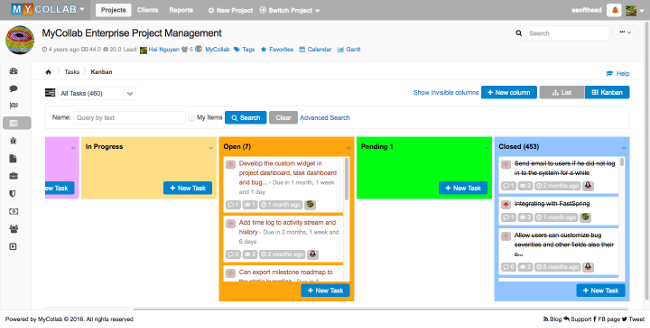
MyCollab is a suite of three collaboration modules for small and midsize businesses: project management, customer relationship management (CRM), and document creation and editing software. There are two licensing options: a commercial "ultimate" edition, which is faster and can be run on-premises or in the cloud, and the open source "community edition," which is the version we're interested in here.
The community edition doesn't have a cloud option and is slower, due to not using query cache, but provides essential project management features, including tasks, issues management, activity stream, roadmap view, and a Kanban board for agile teams. While it doesn't have a separate mobile app, it works on mobile devices as well as Linux, Unix, Windows, and MacOS.
The source code for the latest version of MyCollab is available on GitHub. It is licensed under AGPLv3 and requires a Java runtime and MySQL stack to operate. It's available for download for Linux, Unix, Windows, and MacOS.
OpenProject
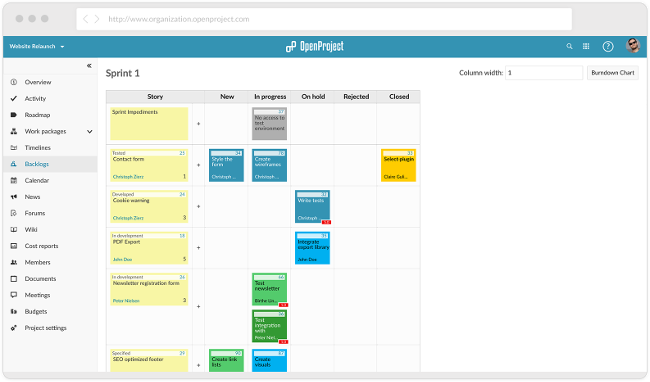
OpenProject is a powerful open source project management tool that is notable for its ease of use and rich project management and team collaboration features.
Its modules support project planning, scheduling, roadmap and release planning, time tracking, cost reporting, budgeting, bug tracking, and agile and Scrum. Its agile features, including creating stories, prioritizing sprints, and tracking tasks, are integrated with OpenProject's other modules. OpenProject also offers options for paid hosting and support with an enterprise edition that adds features such as custom branding, easy Single Sign-On (SSO), additional metadata, and several UX conveniences.
OpenProject is licensed under GPLv3 with source code available on GitHub. Helpful documentation is available for developers at OpenProject.org/development, or you can learn more about installing and configuring it in Birthe Lindenthal's article "Getting started with OpenProject."
Phabricator
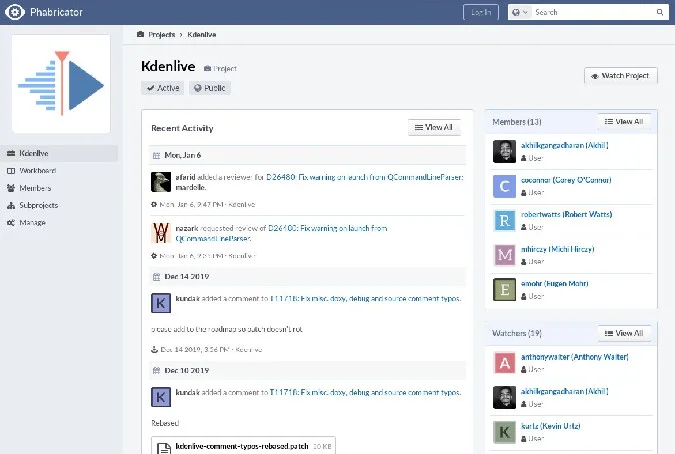
Phabricator is a collection of web apps by Phacility, and it contains far more tasks than the project advertises in its sales pitch. It's unusual for a company to intentionally under sell their product, but that's Phacility's model, but don't be fooled by their modesty. There's Manifest for bug and issue tracking, Projects for Kanban workboards, Diffusion for Git hosting, Phame for blogging, the Phriction wiki, Harbormaster for CI/CD, Conpherence for team chat, and much much more. Everything is intregrated, so there's no "rewiring" required to make your Kanban board affect your bug tracker. There's a dashboard for all of the data, too, so tracking progress can happen at every level.
Phabricator is used by many active projects, including some big KDE applications, like Kdenlive and Krita, so its efficacy has been proven by teams distributed around the globe. It's under constant development and tends to be open to feedback and enhancement requests.
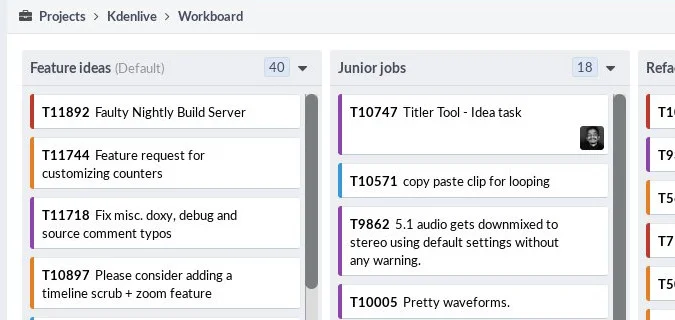
You can run Phabricator on your own server and purchase paid support, or you can pay Phacility for hosting (with a Support Pact included). It's licensed under the Apache 2.0 license and is available from the project's Github mirror.
Gitlab
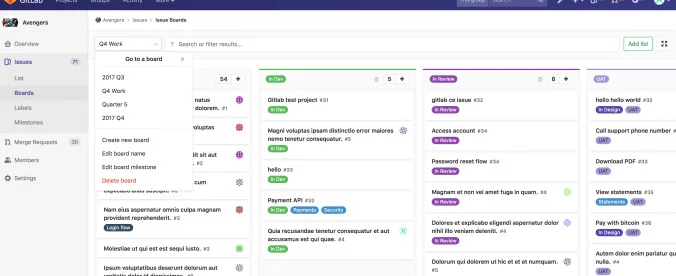
On the Internet, Gitlab is known as a website hosting open source projects in Git repositories. But within the walls of companies and organizations, Gitlab is possibly better known as an open source, locally installed web application for software development and project management. You can pay for hosting plans, or host it yourself, and if you're running the community edition, then you're running only open source components.
Gitlab's community edition is distributed under the MIT license, and supports Agile development through scrum and kanban, sprint planning, epics, bug tracking, documentation, dashboards, charts, scheduling, automation, CI/CD, and more. There are many additional benefits, not the least of which is general developer familiarity with the platform. While many developers may have learned either Microsoft's Github or just pure Git (the open source backend to Github, Gitlab, and many others), it's fair to expect them to understand the workflow of using Git through a web interface.
For the project managers running the show, Gitlab's interface is intuitive, consistent, and robust. A project manager doesn't ever have to leave Gitlab. All tasks, from assigning tasks and planning sprints to accepting merge requests and deleting branches, can be done from within the Gitlab UI.
As Gitlab continues to develop, there's every reason to believe that even more features for project management will be added. The Gitlab developers are happy to take feature requests and are quick to respond to feedback. You can download the Community Edition from Gitlab.com/install.
Odoo
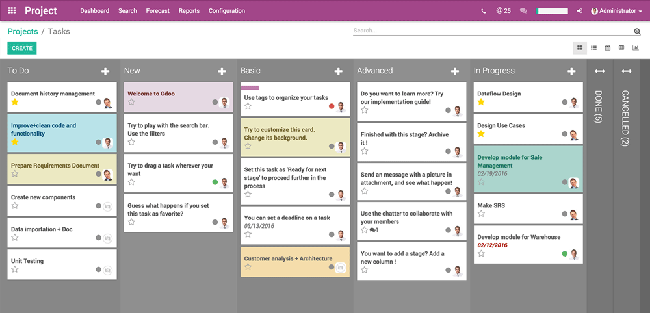
Odoo is more than project management software; it's a full, integrated business application suite that includes accounting, human resources, website and e-commerce, inventory, manufacturing, sales management (CRM), and other tools.
The free and open source community edition has limited features compared to the paid enterprise suite. Its project management application includes a Kanban-style task-tracking view for agile teams, which was updated in its latest release, Odoo 11.0, to include a progress bar and animation for tracking project status. The project management tool also includes Gantt charts, tasks, issues, graphs, and more. Odoo has a thriving community and provides user guides and other training resources.
It is licensed under GPLv3 and requires Python and PostgreSQL. It is available for download for Linux, Windows, and Red Hat Package Manager, as a Docker image, and as source on GitHub.
Taiga
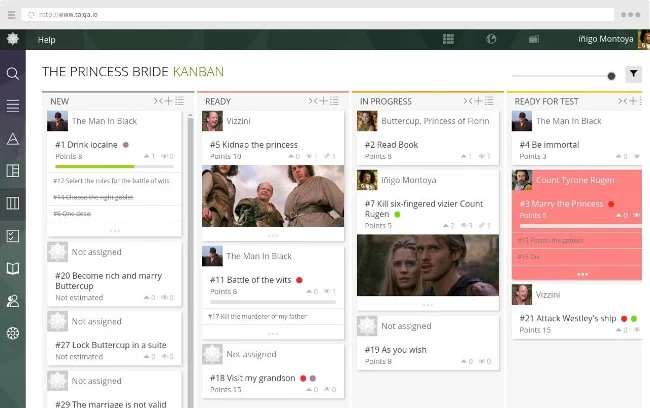
Taiga is an open source project management platform that focuses on Scrum and Agile development, with features including a Kanban board, tasks, sprints, issues, backlog, and epics. Other features include ticket management, multi-project support, wiki pages, and third-party integrations.
It also offers a free mobile app for Android, iOS, and Windows devices, and provides import tools that make it easy to migrate from other popular project management applications.
Taiga is free for public projects, with no restrictions on either the number of projects or the number of users. For private projects, there is a wide range of paid plans but the software's features are the same regardless of what plan you choose.
Taiga is licensed under GNU Affero GPLv3, and requires a stack that includes Nginx, Python, and PostgreSQL. The latest release is available from GitHub.
Tuleap
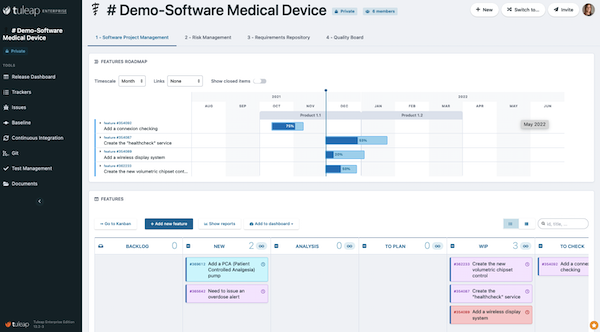
Tuleap is an application lifecycle management (ALM) platform that aims to manage projects for every type of team—small, midsize, large, waterfall, agile, or hybrid—but its support for agile teams is prominent. Notably, it offers support for Scrum, Kanban, sprints, tasks, reports, continuous integration, backlogs, and more.
Other features include issue tracking, document tracking, collaboration tools, and integration with Git, Jenkins, SVN, all of which make it an appealing choice for open source software development projects.
Tuleap is licensed under GPLv2 and is available on Github.
ZenTao
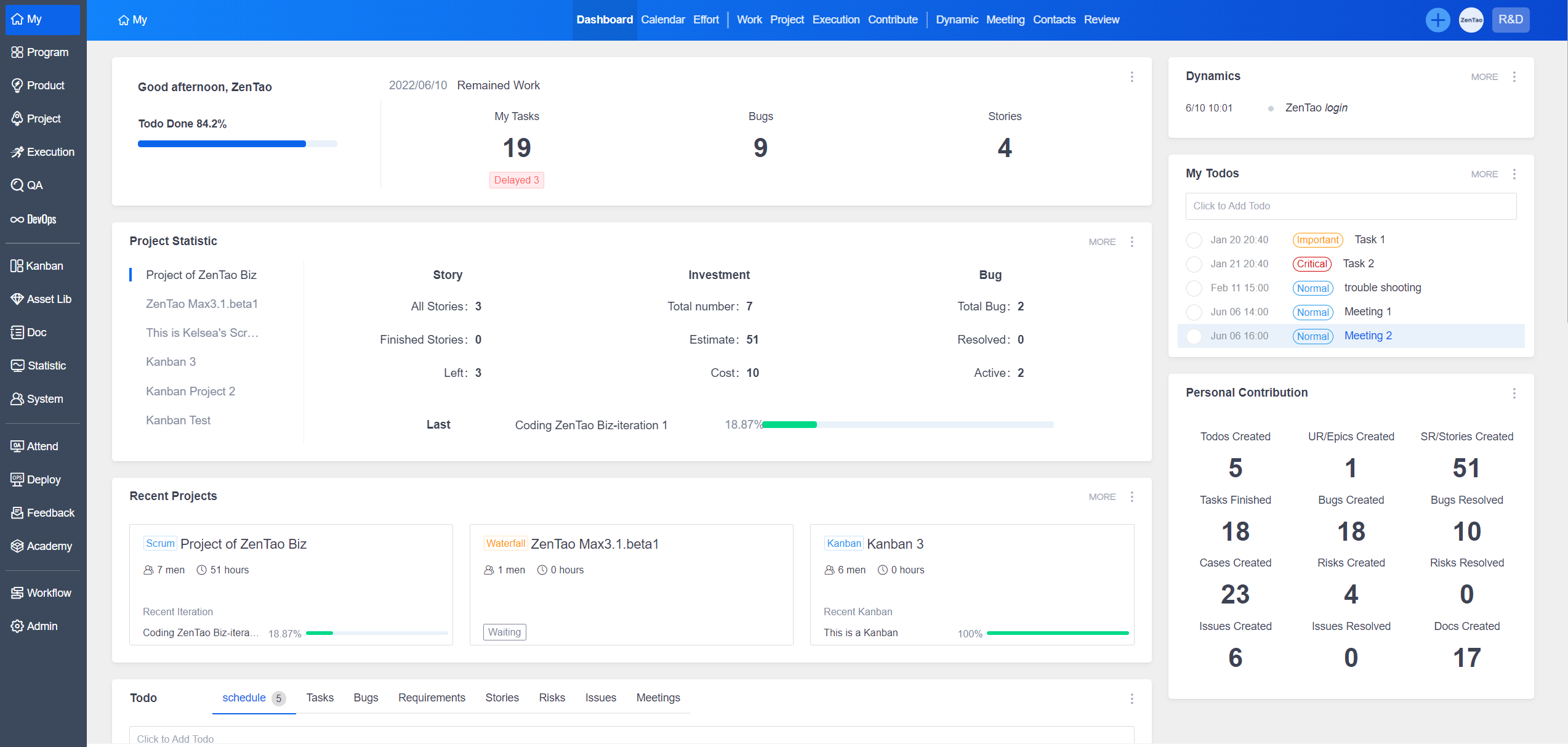 Image by Kelsea Zhang, CC BY-SA 4.0
Image by Kelsea Zhang, CC BY-SA 4.0
ZenTao is a professional project management tool based on the Scrum methodology and Capability Maturity Model Integration (CMMI) philosophy. It has multiple features to cover the entire software development lifecycle. It clearly defines the concepts of program, project, product, and execution to help the production, development, and QA teams coordinate with each other while maintaining separate functionalities.
ZenTao provides three kinds of project management modules: Scrum, Waterfall, and Kanban. Teams can build customized processes through its powerful and flexible workflow. Its testing and bug tracking processes feature everything you need from product creation to release. ZenTao can be integrated with SVN, SonarQube, GitLab, and Jenkins for better code management.
ZenTao is licensed under dual licenses: ZPL and AGPL. It is available for Linux, Windows, and macOS. You can check out its docker image and the source code on GitHub. Download the Open Source Edition (Community Edition) from zentao.pm/download or you can run it in the cloud.
The trouble with this type of list is that it's usually out of date as soon as it's published. Are you using an open source project management tool that supports agile that we forgot to include? Or do you have feedback on the ones we mentioned? Please leave a comment below.
Editor's note: This article was originally published in February 2018 and has been updated with new information.
This article was published in Opensource.com. It is republished by Open Health News under the terms of the Creative Commons Attribution-ShareAlike 4.0 International License (CC BY-SA 4.0). The original copy of the article can be found here.
- Tags:
- Agile methodology
- agile teams
- application lifecycle management (ALM)
- Capability Maturity Model Integration (CMMI)
- Continuous Integration
- Customer relationship management (CRM)
- GitLab
- Kanban
- Kanban board
- Lean
- MyCollab
- Odoo
- open source
- open source project management tools
- open source projects
- OpenProject
- Opensource.com
- Phabricator
- Phacility
- project management tools
- SCRUM
- Scrum methodology
- Taiga
- team collaboration
- Tuleap
- waterfall methodology
- ZenTao
- Login to post comments